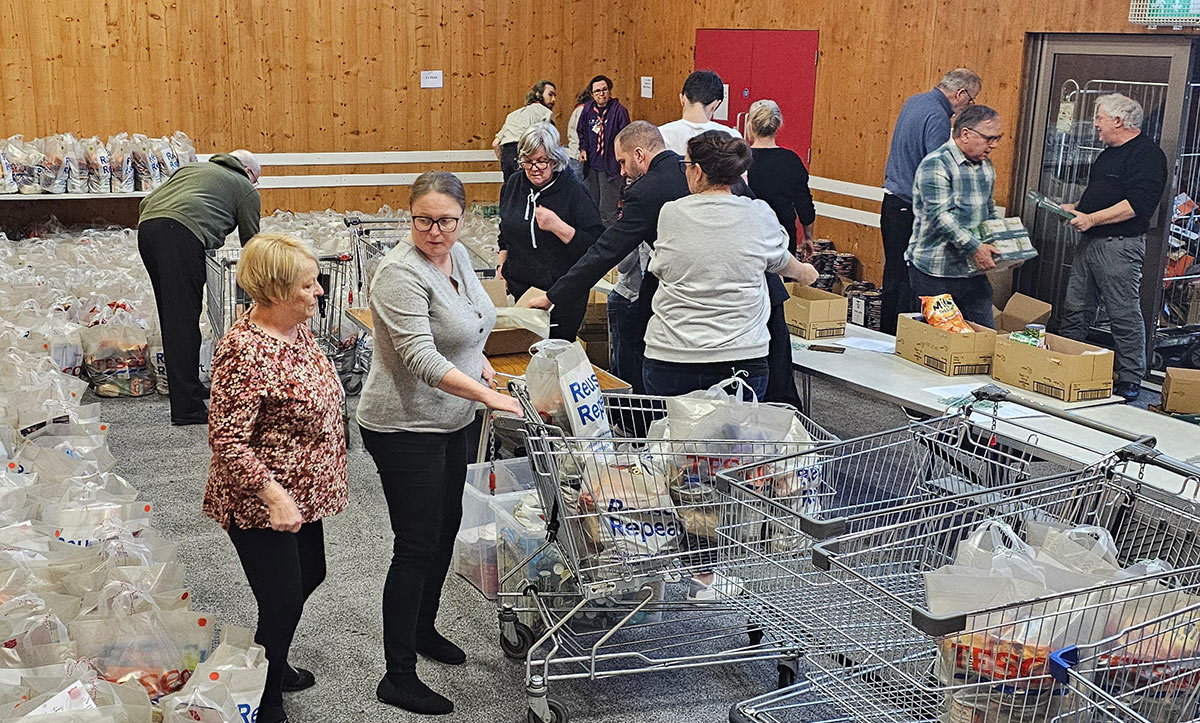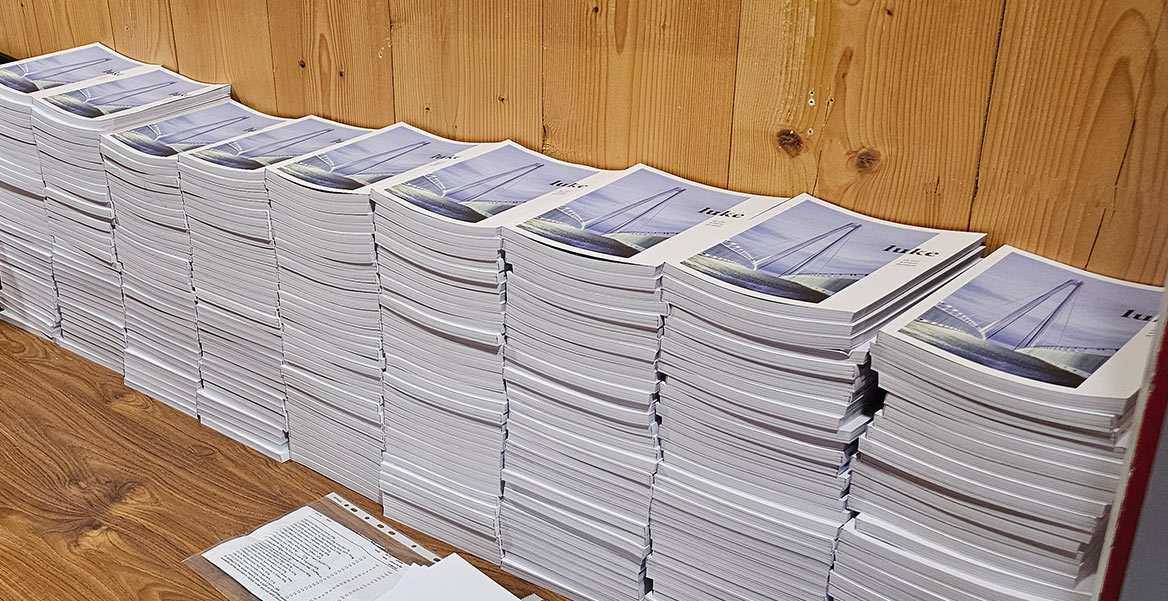We spoke to Major Ian Mountford, one of the officers at Chelmsford Citadel about what mission looks like for the Salvation Army during this Christmas season.
What does Christmas look like as a season of mission for you?
So Christmas is a brilliant season for us to be able to proclaim the hope that we have in the Gospel and to give an invitation for people to respond to that as well.
We’ve given out this Christmas over 1000 food parcels working specifically with schools. So we're working with the families of children who are on Pupil Premium so we're really targeting where those parcels go to. Not just food, but also gifts and toys and things like that. Well, what we've done this year, we’ve brought two different aspects of mission together. We've given everyone a copy of the actual Luke's Gospel in their food parcel. So that's 1000 that have gone out with the food parcels. We've also linked it in with a course called Hope Explored, which is based around Luke's gospel, but it's like a taster session. What we've done is we've integrated the two together. We've given the offer of Luke's gospel, and then the offer of actually coming to explore what that means for three nights, with a meal. So Christmas is a brilliant season for us to be able to proclaim the hope that we have in the Gospel and to give an invitation for people to respond to that as well.
We have a lot of the traditional elements of the Salvation Army, which means at Christmas, we're really busy. We have a very large brass band. They're out about 40 times between now and Christmas in various ways: small groups, large groups. For a long time, we've been able to go out and proclaim the Gospel through music. It's really helpful now to be able to take the [digital Luke’s Gospel] postcards with us and be able to give people the actual word of God to scan on their phone and take away. That's a real great tool to have.
The postcards are so easy to carry and they're so simple to be able to give to someone. We've also got a Hope Explored postcard with it. So we can pair the two together, so that we can say, take the gospel and read it and if you want to ask any more questions, here's how and where you can do it.
And, you know, we're so blessed, because we have such a great team that facilitates this. Our role as church leaders is to equip them and to make the resources available for them to use in the mission they're doing in everyday places. We've got school teachers. We’ve got lots of people involved in healthcare. And their ability to take this with them, and just keep it on them, just be equipped when the time is right, when the Spirit prompts to be able to lead people and give them a copy of the gospel, whether it's by the QR code or a hardcopy, I think it's really encouraging. And the church is pretty fired up about it. They're really encouraged by what we're doing.

How important is it to follow up this gift with an invitation to something?
I think it's crucially important. I think we're good at that in some ways in the church. For example, if people give us a donation, we'll follow up with a thank you letter and a receipt. But if somebody has asked us a question of the gospel, sometimes we sort of neglect a response to that. So we're trying to refocus on the importance of that.
What has the response been like so far?
I have to say, the amount of gospels we've already given away, and certainly the ones I've given away in person myself over the last two weeks, the response has been incredible. I have not had one single person refuse taking a copy of the gospel. We've run a session for asylum seekers here in our drop-in programme and a number of those we've offered them the gospel and they've taken [it]. We've got people that we're working with who are victims of human trafficking. Those are two categories of folks who've really struggled and suffered, that need to explore what hope looks like. And we can demonstrate love in our actions to them, we can be as compassionate as we can be in Christ's name. But again, to offer the very word of hope that is found in the gospel is crucially important.
You’ve also given out the digital Luke’s Gospel postcards to your church community. Why is that?
We've given one copy to every member of the congregation because Luke’s got 24 chapters that's one chapter for each day of Advent. We're encouraging everyone in the church to read each chapter of Luke every day through Advent. And then they wake up Christmas morning, knowing the whole Gospel story. Many of them will know the gospel story, but to wake up having been refreshed with it through the whole of Advent and also there'll be equipped for when people come on the Hope Explored course in January; hopefully, to be able to know for themselves, you can't give away what you don't know.
How else have you prepared as a church for this season of mission?
It's having a leadership team that really live it out themselves. Having a Leadership Team for who the gospel is a reality in their own life. So this isn't just about the text on the paper, as important as this is, this is about people who have experienced the gospel, living it out in a very powerful way. But also, a recognition that it's the work of the whole church it's going to take us all to participate in this. On Sunday we charged the whole congregation and encouraged them to make really good use of the resources available.
We introduced the concept of doing this way back in September. We encourage people to do two things, firstly, to pray. And also if they felt it in their hearts, that they could contribute financially to help us purchase the Gospels because what we wanted to ensure is that none of the money that comes in from our donations to buy food ends up buying gospels, any money is given to us to buy food for our community- that's exactly where it goes.
The giving of the Gospels comes out of the overflow of the hearts of the folk of our church. At Harvest, we have an offering in the Salvation Army and that offering within the congregations is about clear mission intent, and intentional projects. So we said to them, at harvest, would you be willing to support and if so this is what we're going to do with the harvest collection this year, we're going to pay towards buying scripture to give away at Christmas, and the congregation gets double the amount of money we need.
Then we really commissioned folk this last week, to launch out during the season of Advent with the gospel.

Why did you choose to use the Hope Together Luke’s Gospels?
Luke gives us the whole story. The illustrations that are in here at the very beginning, and the way that the gospel here is laid out with the pictures that are helpful, and also the different way the chapters are laid out, without the numbers and with really helpful titles to each chapter is really, really attractive, and it's certainly differently done. How could we not give them away?
Why did you decide to give away copies of Luke’s Gospel this Christmas?
I was struck in the [Talking Jesus] report where it pointed to how many people come to faith and how they come to faith and the recognition that around 24% of people who come to faith, one of the most significant things you come to faith with: Scripture. And I think we can get that though.
I remember as a child being given a copy of the Gideon's Bible in school. I've got friends who've come to faith through reading scripture in prison. I've got friends who've come to faith in times of desperation: the thing they've reached out for is a copy of the gospel just to read. But actually, we live in a world now where many people don't have a copy of the gospel readily available. So we took that as a real challenge, not just to play music that echoes the gospel or to give away gifts that echo the hospitality of the gospel, and the generosity of the gospel but actually to give the gospel in Word as well. That's what we sought to do this Christmas.
What is your hope for giving away Luke’s Gospel?
Scripture tells us the Word of God never returns void. We believe in giving out the gospel that [it] will have an effect on people's lives. It may not be an immediate effect, and maybe that some people put the book onto their bookshelf or in a drawer, and not immediately read it. But when the time comes, the Word of God will be there and people will be able to connect with it. We also pray that people will respond by reading it, that they will access it and read it. And if they've got questions that they will get in touch, and they'll be able to link in with us. We have a lot of people connected with some of the areas that we give out the parcels as well. So we already have people in those places that can make conduit if you like, for those questions.
We shouldn't be afraid. We were reading in Luke's Gospel this Sunday in our church about Mary's own encounter, and that the angel Gabriel came to and said, don't be afraid. Well, we shouldn't be afraid to receive the Word of God, and neither should we be ashamed to proclaim the Word of God. And I think sometimes it's very easy for us to fall into the trap of doing that. It's easy to demonstrate our compassion, it's easy to demonstrate kind words and season's greetings and all that sort of stuff. But to stand firm on the Word of God, I think there's a real challenge to us all.
When we get to Christmas, the whole story has been told. It's the whole mission of God. It's the whole journey of God's mission. We recognise that in the church calendar, the Sunday before Advent, Christ the King Sunday, we recognise this is about God sending his one and only beloved Son into the world. Because there is a mission behind this. There's a purpose behind this. It's his missional intent. And so to understand the fulfilment of that mission, when you get to Christmas Day, to know why that baby was born in Bethlehem on Christmas Day is quite, quite significant.